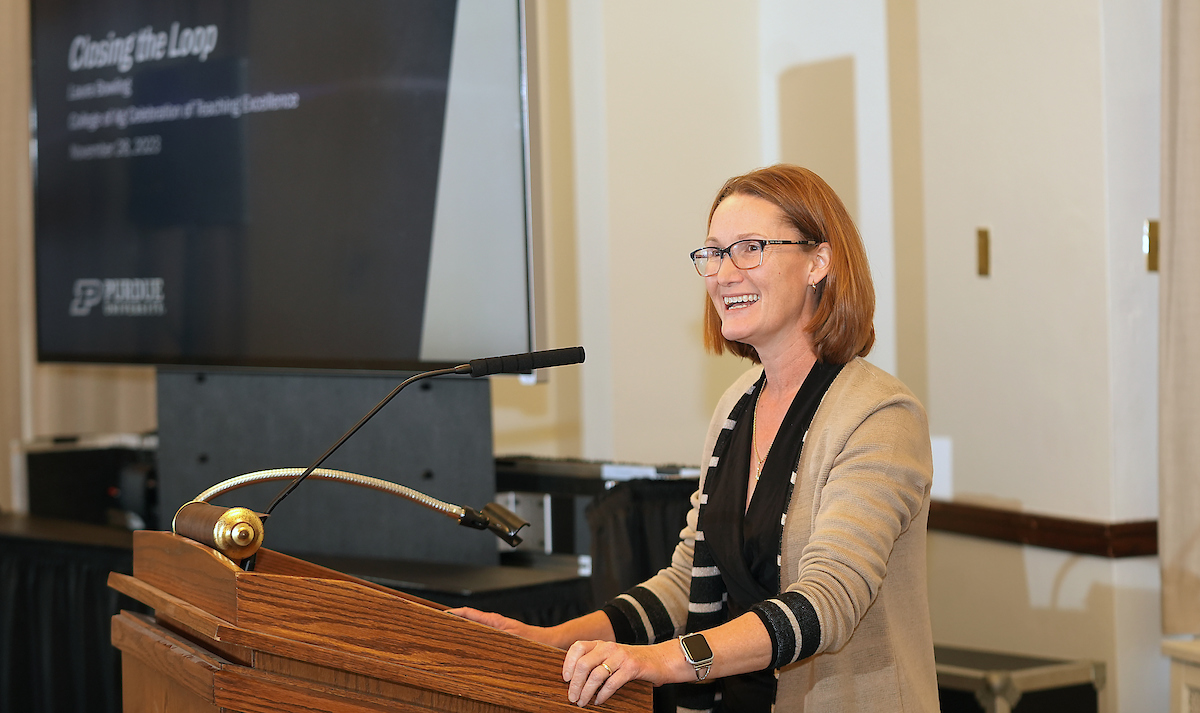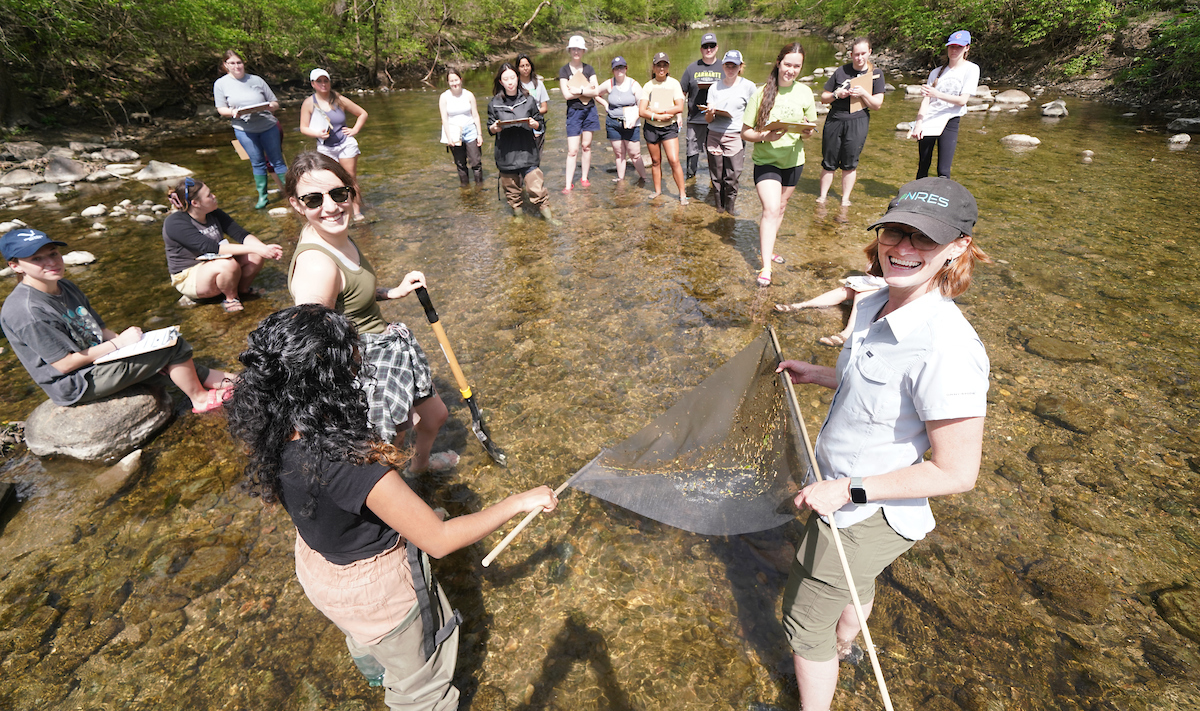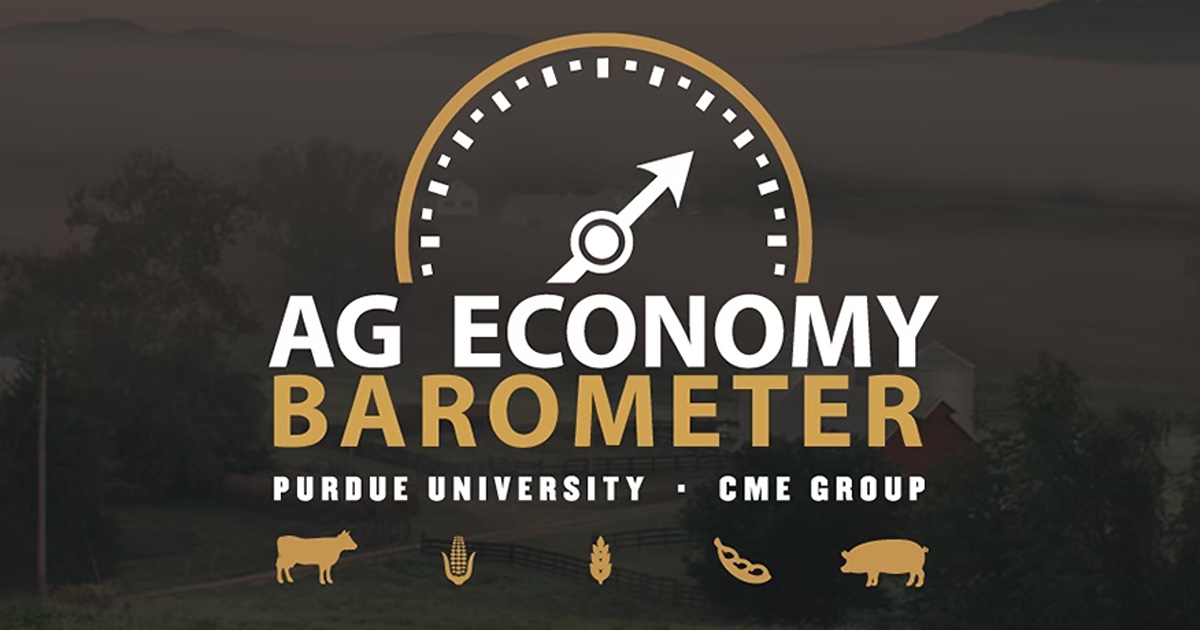Introducing Laura Bowling as agronomy department head
Spring 2004. Two academics in a car are observing localized flooding. Laura Bowling, a new assistant professor at Purdue University, points out the window to the altered ecosystem brought on by the sudden change in the environment. Next to her sits Agronomy Professor Eileen Kladivko, who, having invited Bowling to observe the flood damage, is excited to connect with the young academic through their shared interests. As they discuss their mutual interest, their truck gets stuck in the country road that had collapsed due to flood damage. An enduring kinship is formed between the two.
Two decades later, Bowling is set to assume her role as the head of the department of agronomy. “The department of agronomy has been my home since I started at Purdue 20 years ago,” Bowling explains. “My passion lies in water, but agronomy is at the intersection. It‘s ecosystem management in an agricultural landscape.”
She explains how several aspects of agriculture, including soil science, crops, breeding, genetics and weather, all play into agronomy.
“Agronomy takes a systems approach to how we not only grow food for people but also manage our agricultural landscape.”
Bowling has nothing but high praise for her department.
“Agronomy has been a fantastic academic home. In my experience, everyone has been very supportive of each other.” She notes that while some individuals might focus on one aspect of the mission more than another, every person in the department works to support the land-grant mission.
“We're educating the population at all different levels. We educate students, but we're also helping people manage their land better. That's certainly a powerful mission to get behind.”
Bowling enters a role previously held by Ron Turco, now associate dean and director of Agricultural Research and Graduate Education. Turco praises Bowling’s work ethic and accomplishments.
"As an award-winning professor, researcher and former Natural Resources and Environmental Science (NRES) program director, Dr. Bowling brings a wealth of experience and a proven track record of success in agricultural research and innovation,” Turco says. “With her passion for undergraduate students, her strong strategic vision, and her collaborative approach, Dr. Bowling is poised to guide the Agronomy Department into a new era of growth and advancement.”
 Bowling has received numerous awards, including the Association of Public and Land-grant Universities and U.S. Department of Agriculture’s 2023 Excellence in College and University Teaching Award for Food and Agricultural Sciences, Purdue University's 2023 Charles B. Murphy Outstanding Undergraduate Teaching Award, and the College of Agriculture's 2022 Richard L. Kohls Outstanding Undergraduate Teaching Award.
Bowling has received numerous awards, including the Association of Public and Land-grant Universities and U.S. Department of Agriculture’s 2023 Excellence in College and University Teaching Award for Food and Agricultural Sciences, Purdue University's 2023 Charles B. Murphy Outstanding Undergraduate Teaching Award, and the College of Agriculture's 2022 Richard L. Kohls Outstanding Undergraduate Teaching Award. I have thoroughly enjoyed working together with Laura on many soil and water projects over the years. Her scientific prowess and creativity brought new questions and insights to our work, leading not only to scientific advances but also to improved practical management strategies. Laura will bring fresh perspectives and insights in her new role as department head, combining her skills of careful listening, thoughtful consideration of the past while looking to the future, and a positive attitude about what our department can accomplish together.
- Eileen Klavidko, Agronomy Professor
“When I was finishing my undergraduate degree, I never imagined that I would go on to get a PhD and have a career in academia,” says Bowling. ”It was one of my undergraduate mentors my senior year who suggested it. He said, ‘I think you should get a PhD and teach because you have a great way of explaining things to people.’ I just laughed and moved on. But years later, when I was considering going for a PhD, that comment came back to me. It gave me the confidence to go ahead and make that jump. That moment has become meaningful in reflection because it reminds me that a casual comment you make to a student that you quickly forget can really have a big impact.”
Bowling looks forward to the opportunities her new job offers.
“The department of agronomy has a very long and proud history,” Bowling starts. “We’re central to what agriculture is in this state. Our faculty and staff continue to work across multiple disciplines to constantly improve how we manage our soil, water and crop resources, But we’re also at a point of transition.”
One of her goals is to support junior faculty. Bowling wants to work with faculty to make decisions on modern technology, digitalization, sustainability and agricultural system management within the department.
“For me, helping the department decide where we want to be five years from now and then putting the resources in place to help us get there is my primary goal,” Bowling says.
Bowling feels the experience that will most benefit her as department head of agronomy is her recent position as director of the Natural Resources and Environmental Science program.
“For me, knowing a decision needs to be made for the program that will influence others, as well as knowing that it’s my responsibility to work towards that decision, is a hefty task,” Bowling says.
“You can talk to others, but ultimately you need to be responsive and make the decision as quickly as possible because other people are waiting on you. I think that’s going to become even more important as the head of agronomy. My job is to make sure that other people have the resources that they need so that they can do their job better.”
Bowling, the first female department head of agronomy in the department’s history, has some lessons to share with junior faculty.
“I'd say to make the choices that are going to be right for you, your stage of life and your stage of career. Don’t worry about what other people think is the right path. Ultimately, it's all going to work out.”
She notes that while she certainly can't speak for all women in STEM, she does believe in sharing her own experience with early career colleagues.







